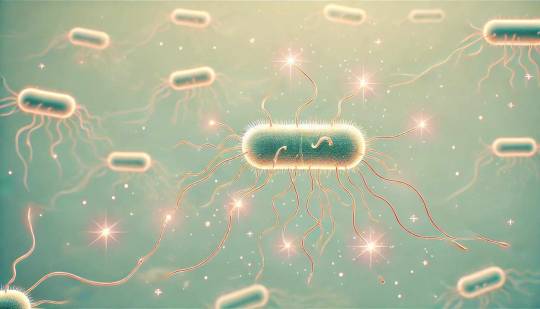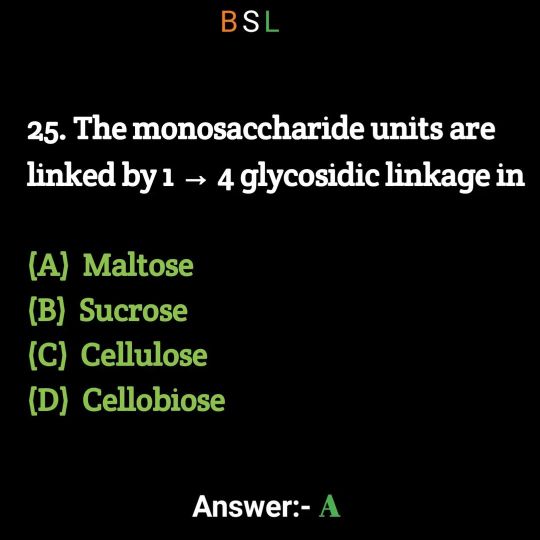#Microbiology & Biotechnology
Explore tagged Tumblr posts
Text

CRISPR was already on thin fucking ice as a serious name for a biotech technique and now they made up CRISPY-BRED are you joking
5K notes
·
View notes
Text
Leiden Ph.D. candidate Jo-Anne Verschoor discovered that nearly 20% of the bacterial strains she studied could degrade plastic, though they needed some encouragement to do so. "Bacteria are just like people," says Verschoor. Her research was published in the journal Communications Biology. Some of the world's smallest organisms could play a significant role in solving the problem of plastic pollution. Increasingly, it is being discovered how certain bacteria can break down plastic into small particles, which can then be recycled. Moreover, Verschoor's research reveals that many more bacteria than previously thought can degrade certain types of plastics. The 27-year-old Leiden microbiologist was able to use a large collection of Streptomyces bacteria, which were already available at the university as scientists use them in the search for new antibiotics.
Continue Reading.
435 notes
·
View notes
Text
Calling all science students and enthusiasts!!
I would absolutely love to have a science-revolving passion project and I’ve narrowed it down to a blog/blog-type-website. I love learning about science but so rarely take the time to actually research the things that interest me. With being a high school student, exams and life this is quite a big task to handle for 1 person and I’d love others to contribute to this!
This is by no means a set plan yet, I’m just sharing a rough idea, so if you could please interact with this post or dm me if you would be interested in something of this kind. Even if you see this 5 months after this was posted (and hopefully a working project or at least WIP) still reach out if you’re interested.
You don’t have to be a great writer for this either nor fascinated about each and every science. My favourite is chemistry, but it would be nice if this project could incorporate the 3 main branches of science: biology, chemistry and physics. It depends on if people would be interested in reading something like this or participating in, and their preferred subjects. You could write about astronomy as a whole, or go into chemistry and analysing electronic configuration, talking about your favourite dinosaur bones in palaeontology, a passive behaviour analysis in psychology, or explaining how exactly scabs work in biology. These would probably be short to mid-length entries and 1/2 times a month.
But this is just my idea and how far I’ve gone with it, feedback is appreciated, there will be more updates to come (not too many until afer my exams in May tho), and I appreciate any reblogs to share this idea with others!
Hopefully a couple people would like to help out in this project and please ask questions if you have any (as a dm or ask) ^^
#studyblr#uni student#university#student#a levels#science#passion project#group project#chemistry#biology#physics#medicine#astronomy#psychology#Sociology#palaeontology#botany#microbiology#toxicology#biotechnology#geology#meteorology#earth science#biochemistry#dark academia#light academia#community project#scienceblr#science blog#the sci journal
118 notes
·
View notes
Text

Electric Bacteria: Harnessing Nature's Microscopic Power Plants for a Sustainable Future
Electric bacteria, or electrogenic microbes, are fascinating organisms capable of generating electricity as part of their natural metabolic processes. Found in diverse environments such as soil, freshwater, and even the human gut, these bacteria can convert organic compounds into electrical energy. This unique ability is primarily observed in species like Shewanella and Geobacter, which use conductive proteins to transfer electrons to external electrodes, functioning like microscopic power plants.
Shewanella oneidensis and Geobacter sulfurreducens are notable examples. These bacteria can form biofilms on electrodes, creating a microbial fuel cell that generates electricity. This phenomenon is not just a scientific curiosity but has practical applications. For instance, microbial fuel cells can be used in wastewater treatment plants to both clean water and generate electricity simultaneously. Additionally, electrogenic bacteria are being explored for bioremediation, helping to clean up polluted environments by breaking down contaminants and converting them into less harmful substances.
The potential of electric bacteria extends to sustainable energy solutions. By harnessing their natural abilities, researchers aim to develop innovative technologies that offer renewable energy sources. The intersection of microbiology and energy technology could lead to breakthroughs that address some of the world's pressing environmental challenges.
References:
Lovley, D. R. (2012). Electromicrobiology. Annual Review of Microbiology, 66, 391-409.
Nealson, K. H., & Rowe, A. R. (2016). Electromicrobiology: Realities, grand challenges, goals and predictions. Microbial Biotechnology, 9(5), 595-600.
Logan, B. E. (2009). Exoelectrogenic bacteria that power microbial fuel cells. Nature Reviews Microbiology, 7(5), 375-381.
5 notes
·
View notes
Photo

Carbohydrates MCQ 25 Link in bio ☝️ for more mcqs recommendations #biotechnology #biology #science #microbiology #biotech #biochemistry #molecularbiology #research #genetics #scientist #dna #medicine #laboratory #biotechnologist #cellbiology #lab #microbiologist #medical #chemistry #biotechnologystudent #biologystudent #bio #biologymemes #lifescience #neet #bioinformatics #covid #zoology #microscope #bacteria (at Royal City Nanded) https://www.instagram.com/p/Cp4AbWivdeN/?igshid=NGJjMDIxMWI=
#biotechnology#biology#science#microbiology#biotech#biochemistry#molecularbiology#research#genetics#scientist#dna#medicine#laboratory#biotechnologist#cellbiology#lab#microbiologist#medical#chemistry#biotechnologystudent#biologystudent#bio#biologymemes#lifescience#neet#bioinformatics#covid#zoology#microscope#bacteria
3 notes
·
View notes
Text
Anyone who has looked at the health statistics, medical conditions, and sexually transmitted diseases that characterize the gay male lifestyle will know that such willful destruction of the human body is neither loving nor liberating.
~ Carl Trueman
#gay healthcare#medical#hiv and aids; infectious diseases; immune system; std; biology; biotechnology; microbiology; molecular biology#gay pride month#lgbtq+
1 note
·
View note
Photo

It's my life 🙂🧑🔬 .. Follow & explore the amazing science world🔬👇 @sdsbiology for exploring the amazing world of biology and science 😍😍❤️#sdsbiology ♡ ㅤ ❍ㅤ ⎙ㅤ ⌲ ˡᶦᵏᵉ ᶜᵒᵐᵐᵉⁿᵗ ˢᵃᵛᵉ ˢʰᵃʳᵉ 🅻🅸🅺🅴 , 🆂🅷🅰🆁🅴 🅰🅽🅳 🅲🅾🅼🅼🅴🅽🆃 .. #medical #biology #cellbiology #college #immunology #genetics #ecology #virus #bacteria #science #microbiology #biotechnology #biotech #zoology #neet #bacteriology #bacteriologia #hormones #viruses #virology #school #mbbs #instagram #ınstagood #neet #cbse #aiims #glucose #neet . https://www.instagram.com/p/CpnSbl4J1Dh/?igshid=NGJjMDIxMWI=
#sdsbiology#medical#biology#cellbiology#college#immunology#genetics#ecology#virus#bacteria#science#microbiology#biotechnology#biotech#zoology#neet#bacteriology#bacteriologia#hormones#viruses#virology#school#mbbs#instagram#ınstagood#cbse#aiims#glucose
2 notes
·
View notes
Text

#biotechnology#biology#science#microbiology#biotech#biochemistry#molecularbiology#research#genetics#scientist#dna#medicine#laboratory#biotechnologist#cellbiology#lab#microbiologist#medical#chemistry#biotechnologystudent#biologystudent#bio#biologymemes#lifescience#neet#bioinformatics#covid#zoology#microscope#bacteria
2 notes
·
View notes
Text
1 note
·
View note
Text
Exploring Cisplatin's Potential as a Repurposed Therapy for Type 2 Diabetes: A Systems Biology Approach
The document i was reading recently is titled “Cisplatin’s Potential for Type 2 Diabetes Repositioning by Inhibiting CDKN1A, FAS, and SESN1” explores how cisplatin, a chemotherapeutic agent traditionally used to treat cancer, might have therapeutic potential for type 2 diabetes mellitus (T2DM). The study employs an integrative systems biology approach to analyze cisplatin-induced differentially…
0 notes
Text

The #Etallwit Stackable Incubator Shaker with CO2 Controller is the perfect solution for labs that need precision, versatility, and efficient use of space. With its upward door design and 50mm shaking diameter, this incubator shaker provides optimal conditions for cell culture and microbiological research.
Maximize your lab's productivity and precision with this space-saving, high-performance incubator shaker. Your research deserves the best tools.
👉 Discover more: https://www.etallwit.com/products/detail/138-401L-Upward-Door-Stackable-CO2-Incubator-Shaker
0 notes
Text
A new study titled "Biomimetic hepatic lobules from three-dimensional imprinted cell sheets" has been led by Prof. Yuanjin Zhao of the Department of Hepatobiliary Surgery, Hepatobiliary Institute, Nanjing Drum Tower Hospital, Medical School, of Nanjing University in China. The research is published in the journal Science Bulletin. To establish high-precision liver lobules, researchers utilized spatial proteogenomic datasets to identify the multicellular specific composition in the normal human liver. Based on this data and cell membrane slicing technology, researchers then employed a newly developed 3D printing strategy to print and carve liver cell sheets with hexagonal hollow cross-sectional structures.
Continue Reading.
82 notes
·
View notes
Text
Comprehensive Biotech Job Training for a Thriving Career in Biotechnology

Introduction In the rapidly growing field of biotechnology, practical skills and industry knowledge are essential for career success. Biotech job training programs serve as a bridge between academic knowledge and real-world applications, equipping students and professionals with the tools needed to excel in diverse biotech roles. At Amplikon Biosystems, we offer holistic training opportunities, including Biotech Placement Training, Biotech Project Dissertation Programs, and Industrial Biotech Internships, tailored to meet industry demands and individual career goals.
Why Biotech Job Training is Essential
Biotechnology encompasses a vast range of applications, from genetic engineering to drug development and environmental biotechnology. However, employers seek candidates who bring more than theoretical understanding—they want professionals with hands-on experience and problem-solving skills. Biotech job training provides the necessary exposure to advanced techniques, laboratory operations, and industry practices, ensuring you stand out in a competitive job market.
Key Features of Amplikon Biosystems' Biotech Job Training
Biotech Placement Training Designed to prepare students for immediate industry roles, this program focuses on job readiness. Key components include resume building, interview preparation, and training in industry-relevant techniques like PCR, ELISA, and bioinformatics tools. Our placement training also includes connections with leading biotech companies, increasing your chances of landing the right opportunity.
Biotech Project Dissertation Program Ideal for students and researchers, this program offers in-depth exposure to project planning, execution, and reporting. Participants work on cutting-edge projects in areas like molecular biology, microbiology, and pharmaceutical development. Guided by experienced mentors, this training enhances research skills and contributes to academic and professional growth.
Industrial Biotech Internship This hands-on internship provides real-world exposure to biotech operations within industrial settings. From understanding bioprocessing to mastering quality control protocols, interns gain valuable insights that prepare them for careers in pharmaceutical companies, research labs, and biotech startups.
How Biotech Job Training Prepares You for Success
Hands-On Experience: Practical lab sessions and industry projects provide the technical skills employers seek.
Industry-Relevant Curriculum: Programs are designed in collaboration with biotech leaders to match current trends and demands.
Networking Opportunities: Collaborate with peers, mentors, and industry professionals to build meaningful connections.
Career Guidance: Expert mentorship and placement assistance ensure smooth transitions into the biotech workforce.
Who Can Benefit from These Programs?
Students: Enhance your academic learning with practical experience.
Graduates: Build a strong foundation for a biotech career.
Professionals: Upgrade your skills for better roles and opportunities.
Career Outcomes of Biotech Job Training
Graduates of Amplikon Biosystems' training programs have gone on to excel in roles such as:
Research Associates
Laboratory Technicians
Bioprocess Engineers
Clinical Trial Coordinators
Quality Control Analysts
Why Choose Amplikon Biosystems for Your Biotech Training?
With years of experience in the biotechnology industry, Amplikon Biosystems is committed to bridging the gap between education and industry. Our state-of-the-art facilities, expert faculty, and industry connections make us a trusted partner for aspiring biotech professionals.
Conclusion
Investing in Biotech Job Training is the first step towards a successful career in biotechnology. Whether you’re looking to enhance your employability through Biotech Placement Training, deepen your research skills with the Biotech Project Dissertation Program, or gain practical exposure through an Industrial Biotech Internship, Amplikon Biosystems has the right program for you.
Start your journey with us today and take the leap toward a fulfilling and impactful biotech career. Visit our website or contact us for more details on enrollment and program offerings.
0 notes
Text
Real-time PCR Market - Forecast(2024 - 2030)
𝐑𝐞𝐚𝐥-𝐓𝐢𝐦𝐞 𝐏𝐂𝐑: 𝐄𝐬𝐬𝐞𝐧𝐭𝐢𝐚𝐥 𝐓𝐨𝐨𝐥 𝐟𝐨𝐫 𝐌𝐨𝐝𝐞𝐫𝐧 𝐌𝐨𝐥𝐞𝐜𝐮𝐥𝐚𝐫 𝐁𝐢𝐨𝐥𝐨𝐠𝐲 𝐄𝐱𝐩𝐥𝐚𝐢𝐧𝐞𝐝
The global real-time PCR (qPCR) market is experiencing significant growth, driven by several key factors. The market, valued at $22.03 billion in 2024, is projected to reach $27.78 billion by 2028. This growth is largely due to the increasing prevalence of infectious diseases, the rise of cancer diagnostics, and expanding research in genomics.

The method that creates multiple copies of a particular DNA region in vitro uses the polymerase chain reaction. The technique relies on a DNA polymerase known as TAQ polymerase, which is thermostable. Thermus aquaticus is used to produce this polymerase. They occupy hot springs and hydrothermal vents. The target region to be reproduced is produced in large numbers by the PCR reaction, which involves repeat cycles at a range of temperatures.
Real-time PCR systems are laboratory instruments used to increase the number of copies of specific DNA segments. The rising prevalence of chronic and infectious diseases is driving the growth of the market for real-time polymerase chain reaction (PCR). Furthermore, forensics, diagnostics, and proteomics research advancements are creating potential growth opportunities for the real-time polymerase chain reaction (PCR) market.
📚Inquiry Before Buying :https://www.industryarc.com/reports/request-quote?id=503967&utm_source=Medium&utm_medium=Referral&utm_campaign=Deva
The polymerase chain reaction (PCR) has been used and shown to be effective in detecting minute amounts of a wide range of infectious diseases. The best conditions for amplification vary depending on the organisms of interest. PCR was used as a rapid and sensitive method for detecting infectious agents, and three assay systems were developed, one for the amplification of human T cell leukaemia virus type I, one for Mycobacterium tuberculosis, and one for Mycoplasma pneumoniae. These all factors will propel the market.
The increased use of the polymerase chain reaction for cancer diagnosis is expected to drive market growth in the coming years. All of these factors are responsible for creating a greater demand for this technique in the coming years, research and development activities for providing innovative molecular biology and forensic science as there has been a great demand for genetic engineering as well as personalized medicines.
📚Schedule a Call :https://connect.industryarc.com/lite/schedule-a-call-with-our-sales-expert?utm_source=Medium&utm_medium=Referral&utm_campaign=Deva
The global real-time PCR (qPCR) market is experiencing significant growth, driven by several key factors. The market, valued at $22.03 billion in 2024, is projected to reach $27.78 billion by 2028. This growth is largely due to the increasing prevalence of infectious diseases, the rise of cancer diagnostics, and expanding research in genomics. Real-time PCR remains a vital tool in healthcare, pharmaceuticals, and biotechnology for applications such as early disease detection, personalized medicine, and molecular diagnostics
COVID-19 had a substantial impact on the PCR market, as demand for reliable diagnostic tools surged. The pandemic underscored the importance of real-time PCR for detecting viral infections like SARS-CoV-2, making it an essential part of disease management worldwide. This trend continues to fuel demand, especially as the technology evolves with innovations like digital PCR and multiplex assays
Buy Now: https://www.industryarc.com/buynow?id=503967&utm_source=Medium&utm_medium=Referral&utm_campaign=Deva
Regionally, North America dominates the market due to its strong healthcare infrastructure and high prevalence of diseases like hepatitis and HIV. However, the Asia-Pacific region is expected to see the fastest growth, with rising patient awareness and investments in healthcare across countries like China, Japan,
More about Real-time PCR Market report click here
#moleculardiagnostics#geneticanalysis#genomics#biotechnology#clinicalresearch#diagnostics#covid19testing#dna#rna#genetherapy#pathogenresearch#microbiology#healthcare#viraltesting#geneticresearch#bioresearch#molecularbiology#dnaresearch#biotech#medicalresearch
0 notes
Photo

Protein MCQ 46 Link in bio ☝️ for more mcqs recommendations #biotechnology #biology #science #microbiology #biotech #biochemistry #molecularbiology #research #genetics #scientist #dna #medicine #laboratory #biotechnologist #cellbiology #lab #microbiologist #medical #chemistry #biotechnologystudent #biologystudent #bio #biologymemes #lifescience #neet #bioinformatics #covid #zoology #microscope #bacteria (at Royal City Nanded) https://www.instagram.com/p/Cp9r2uFPedi/?igshid=NGJjMDIxMWI=
#biotechnology#biology#science#microbiology#biotech#biochemistry#molecularbiology#research#genetics#scientist#dna#medicine#laboratory#biotechnologist#cellbiology#lab#microbiologist#medical#chemistry#biotechnologystudent#biologystudent#bio#biologymemes#lifescience#neet#bioinformatics#covid#zoology#microscope#bacteria
4 notes
·
View notes
Text
can anyone tell me what species these contaminants are? i really fucked up these plates :')








#microbiology#biology#Mold#slime mold#bacteria#bacteriology#biotechnology#science#petri dish#bacterial contamination
1 note
·
View note